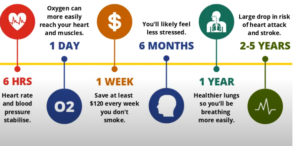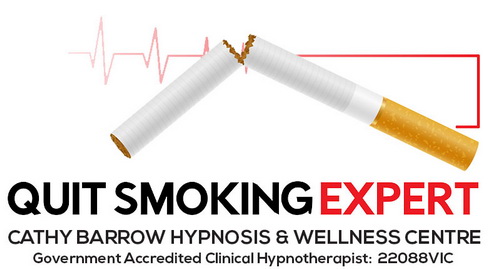Benefits Of Quitting Smoking
The Health benefits of quitting smoking will become apparent immediately after you stop.
Health  Benefits of quitting smoking
Benefits of quitting smoking
This is what happens to your body after you Quit Smoking?
- .After 1 hour In as little as 20 minutes after the last cigarette is smoked, the heart rate drops and returns to normal. Blood pressure begins to drop, and circulation may start to improve.
- After 12 hours Cigarettes contain a lot of known toxins including carbon monoxide, a gas present in cigarette smoke. This gas can be harmful or fatal in high doses and prevents oxygen from entering the lungs and blood. When inhaled in large doses in a short time, suffocation can occur from lack of oxygen. After just 12 hours without a cigarette, the body cleanses itself of the excess carbon monoxide from the cigarettes. The carbon monoxide level returns to normal, increasing the body’s oxygen levels.
- After 1 day Just 1 day after quitting smoking, the risk of heart attack begins to decrease. Smoking raises the risk of developing coronary heart disease by lowering good cholesterol, which makes heart-healthy exercise harder to do. Smoking also raises blood pressure and increases blood clots, increasing the risk of stroke.In as little as 1 day after quitting smoking, a person’s blood pressure begins to drop, decreasing the risk of heart disease from smoking-induced high blood pressure. In this short time, a person’s oxygen levels will have risen, making physical activity and exercise easier to do, promoting heart-healthy habits.
- After 2 days Smoking damages the nerve endings responsible for the senses of smell and taste. In as little as 2 days after quitting, a person may notice a heightened sense of smell and more vivid tastes as these nerves heal.
- After 3 days 3 days after quitting smoking, the nicotine levels in a person’s body are depleted. While it is healthier to have no nicotine in the body, this initial depletion can cause nicotine withdrawal. Around 3 days after quitting, most people will experience moodiness and irritability, severe headaches, and cravings as the body readjusts.
- After 1 month In as little as 1 month, a person’s lung function begins to improve. As the lungs heal and lung capacity improves, former smokers may notice less coughing and shortness of breath. Athletic endurance increases and former smokers may notice a renewed ability for cardiovascular activities, such as running and jumping.
- After 1-3 months For the next several months after quitting, circulation continues to improve.
- After 9 months Nine months after quitting, the lungs have significantly healed themselves. The delicate, hair-like structures inside the lungs known as cilia have recovered from the toll cigarette smoke took on them. These structures help push mucus out of the lungs and help fight infections. Around this time, many former smokers notice a decrease in the frequency of lung infections because the healed cilia can do their job more easily.
- After 1 year One year after quitting smoking, a person’s risk for coronary heart disease decreases by half. This risk will continue to drop past the 1-year mark.
- After 5 years Cigarettes contain many known toxins that cause the arteries and blood vessels to narrow. These same toxins also increase the likelihood of developing blood clots. After 5 years without smoking, the body has healed itself enough for the arteries and blood vessels to begin to widen again. This widening means the blood is less likely to clot, lowering the risk of stroke. The risk of stroke will continue to reduce over the next 10 years as the body heals more and more.
- After 10 years After 10 years, a person’s chances of developing lung cancer and dying from it are roughly cut in half compared with someone who continues to smoke. The likelihood of developing mouth, throat, or pancreatic cancer has significantly reduced.
- After 15 years After 15 years of having quit smoking, the likelihood of developing coronary heart disease is the equivalent of a non-smoker. Similarly, the risk of developing pancreatic cancer has reduced to the same level as a non-smoker.
- After 20 years After 20 years, the risk of death from smoking-related causes, including both lung disease and cancer, drops to the level of a person who has never smoked in their life. Also, the risk of developing pancreatic cancer has reduced to that of someone who has never smoked.
